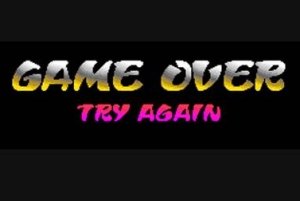“Replayability” Not Just for Video Games
Replayability or the “do over” gives the player permission to fail. In games, failure is an option. And it’s a good one. Allowing a player to fail with minimal consequences encourages exploration, curiosity and discovery. It encourages engagement. Knowing that you can always restart the game provides a sense of freedom and players take advantage of that freedom by placing their characters into danger to see what will happen, by using a tactic like running out into the open to learn where the enemies are hiding or even spending too much on one resource and not enough on another to determine the consequences. Games provide the opportunity to explore a set of rules test hypotheses and to remember which approaches were successful and which ones failed.

In games, unlike many other activities, exploring failure and what it means is a valued approach. Players enjoy failures in a game or, at least, use them to progress. The idea of failure is part of the gamer ethos. No one expects to successfully navigate and win a game the first time they play it. In fact, they expect to fail. And look forward to the lessons learned during the failure process.
Failure adds an additional level of content to the game because it makes the player reconsider his or her approach to the game. The necessity to approach the game differently than originally planned adds to the game and expands the playability of the game. This is because often two or more approaches are viable to successfully navigating the game and the player, once made aware of a failed approach, is free to explore other options for success.
Winning a game without failure or a do over is a dissatisfying experience. For a player to truly enjoy the game, he or she must feel that something was accomplished and achieved. Failing several times before success instills the feeling of accomplishment once a winning state is achieved. The act of failing multiple times makes the act of winning more pleasurable
So how does this relate to real life, we don’t start with three lives, we start and end with one. The problem as I see it is not the number of lives, but our acceptance of failure as an option. We tend to think that great people tried what they are great at once and were instantly successful. Not the case. Steve Jobs, Thomas Edison both tried and failed several times.
Oprah Winfrey was fired from her first job because she was unfit for TV–now she has her own TV network and Steven King was rejected 30 times for his book, “Carrie.” J.K. Rowling was on welfare. It is not simply a matter of talent, it is a matter of “do overs.” Do you accept them or, like Wile E. Coyote, do you fail and move on to something else and never try the same thing again? Tweeking what you’ve done until you get it right.
Even on TV shows that award one spectacular winner, like American Idol, losing can still be profitable. Jennifer Hudson came in seventh place during the third season of the show but that didn’t stop her from being the only Idol to win an Oscar for her role in Dreamgirls.
We often feel that we only have “one shot” at an endeavor, that notion simply isn’t true. Most often, we are in situations where we can “do over” our failure and we can learn from our mistakes. Don’t think of opportunities as a “once in a life time” or “one and done”, instead think of them in terms of a video game with replayablity that allows us multiple chances to find success.
Posted in: Games, Gamification
Leave a Comment (0) ↓